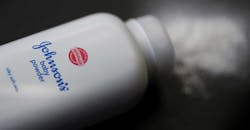J&J Says No Asbestos Found in Baby Powder, Disputing FDA Test
Johnson & Johnson said that multiple lab tests found no sign of asbestos in a recalled lot of baby powder, putting the health products giant at odds with U.S. health regulators who stuck by results that detected a trace amount of the carcinogen.
J&J is facing nearly 17,000 lawsuits claiming that asbestos in its popular baby powder products gave people cancer. On Oct. 18, J&J said that it would pull a single lot of 33,000 bottles off the market after a Food and Drug Administration-conducted test uncovered tiny amounts of the contaminant in one bottle of the product.
The recall announcement after the FDA’s finding sent the company’s stock plunging, as investors read into what the findings meant for J&J’s defense in the suits. The company maintains that it tests rigorously for contamination in its products and that they are safe.
J&J’s new tests of the baby powder, announced Tuesday, put the New Brunswick, New Jersey-based company squarely at odds with the regulatory agency.
Fifteen new tests of the bottle that the FDA said had trace amounts of asbestos found no sign of the carcinogen, the company said in a statement. J&J also ran 48 more tests on samples from the lot, and said it found nothing.
“Rigorous and third-party testing confirms there is no asbestos in Johnson’s Baby Powder. We stand by the safety of our product,” J&J said in the statement. The company suggested that contamination of a lab, which it recreated in several of its own third-party tests, could have caused the FDA’s positive result.
Steve Musser, deputy director for scientific operations in the FDA’s Center for Food Safety and Nutrition, said that while J&J has said the product is confirmed to be free of asbestos based on their testing, the FDA “would say the opposite” for the sample it reviewed.
In a separate statement, the FDA said that because of the small sample size used in the tests, it was possible for results to vary. The FDA said that one sub-sample came back negative, and two came back positive.
“Different samples may provide different results,” the agency said. “We stand by our findings.”
Legal Risk
At stake are billions of dollars in potential legal liabilities, as well as the trust of customers who have seen repeated negative headlines about the brand. J&J shares gained 3.4% in trading after the market closed in New York. They’re roughly flat this year as the company faces more than 100,000 lawsuits over baby powder, opioids and other products.
Retailers including CVS Health Corp. and Walgreens Boots Alliance Inc. have pulled all 22-ounce bottles of the powder from stores to make sure that no customers are exposed to potentially tainted talc.
J&J said that it put the baby powder samples through a variety of tests, including attempting to create a variety of laboratory environments. In one test, the company said lab conditions may have introduced trace amounts of asbestos through an air conditioner that was contaminated. J&J said it worked with two outside laboratories to conduct the tests, using a variety of methods, and had conducted checks for years.
“Our talc has also been tested and confirmed to be asbestos-free by a range of independent laboratories, universities and global health authorities,” J&J said.
Leigh O’Dell, an Alabama-based lawyer who is leading the talc plaintiffs’ cases that are consolidated before a federal judge in New Jersey, said J&J’s retesting move may be more about bolstering its shares than its talc defenses.
“Given the stock market and retailer reaction to the FDA’s finding of asbestos in Johnson’s Baby Powder, it’s not surprising that J&J is attempting to discredit that report through its own testing,” she said in an emailed statement.
Lyndsay Meyer, an FDA media relations director, said the agency continues to stand by its results and supports J&J’s voluntary recall conducted earlier this month. The health-care company declined to comment on the agency’s response.
About the Author
Bloomberg
Licensed content from Bloomberg, copyright 2016.
